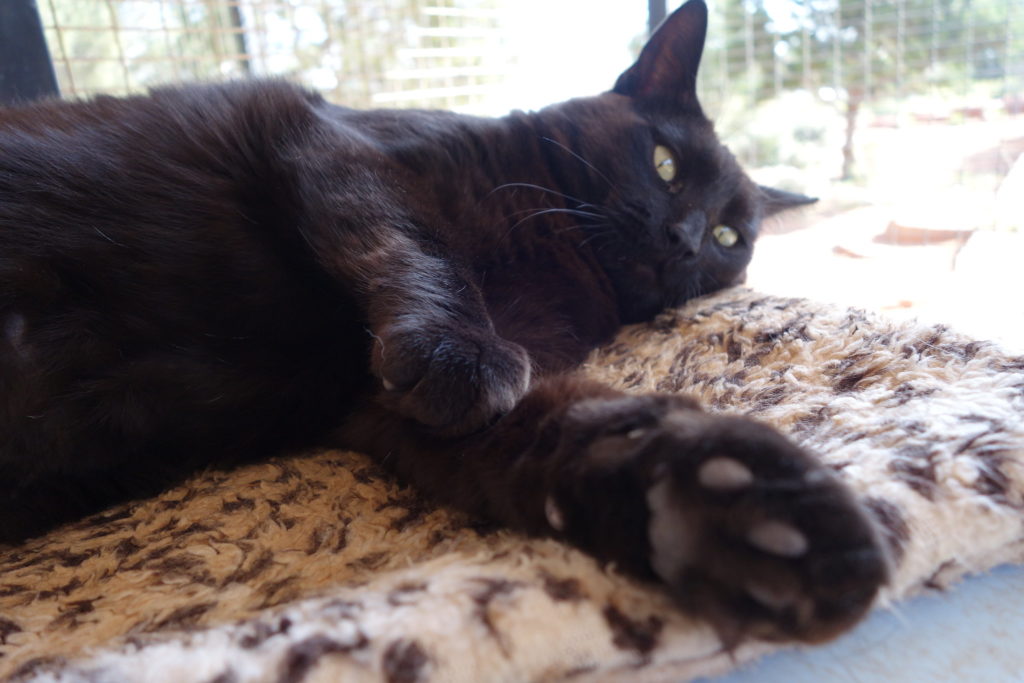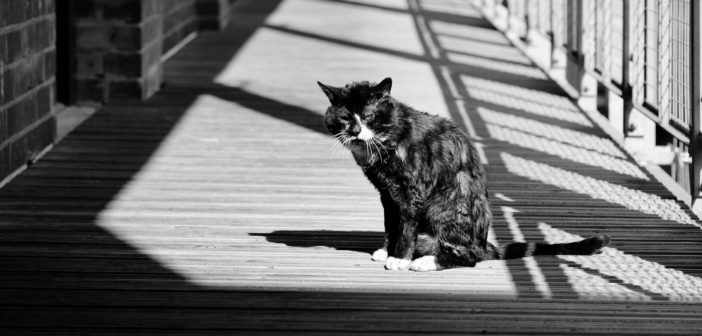Feline Immunodeficiency Syndrome (FIV) is an acquired virus, similar to Human Immunodeficiency Syndrome (HIV). It slowly compromises a cat’s immune system and weakens their defensive functions. Thus, the animal becomes more vulnerable to secondary diseases and infections such as upper respiratory infections, ringworm, and dental diseases.
Although it may be tolerated well, in rare cases (less than 5%) the virus can eventually destabilize the whole immune system in its feline host by destroying certain types of cells. Sadly, there is no completely effective way of diminishing or curing FIV. A vaccine is available, although its efficacy remains uncertain.
Treatment for FIV focuses mainly on extending the asymptomatic period or, if symptoms have set in, on easing the secondary effects of the virus. Once symptoms do develop, however, they may continually progress or a cat may show signs of sickness interspersed with health for years.
Cats with FIV can live long and happy lives. Luckily, FIV is not often fatal for cats.
“Cats infected with FIV may not show symptoms until years after the initial infection occurred. Although the virus is slow-acting, a cat’s immune system is severely weakened once the disease takes hold. This makes the cat susceptible to various secondary infections. Infected cats receiving supportive medical care and kept in a stress-free, indoor environment can have relatively comfortable lives for months to years before the disease reaches its chronic stages.”
American Society for the Prevention of Cruelty to Animals
Humans can not catch FIV
FIV is not contagious to humans or other (non-feline) animals. So, it cannot be transmitted to them. This means that we can share the same living space and freely interact with FIV-positive cats with zero risk to our health. So, if you come across a FIV infected cat, there is absolutely no need to panic or avoid contact. You are totally safe!
However, other cats can get FIV. How is FIV transmitted?
An active or passive FIV carrier can transmit the virus to other cats. This may happen through deep bite wounds, especially during aggressive and bloody cat fights and territorial disputes that usually occur outdoors. If the virus is present in the infected cat’s saliva, it may enter the body tissues of a healthy cat and rapidly replicate cells.
Pregnant females can also pass FIV on to their offspring in uterus, but these cases are comparatively rare.
FIV does not seem to be commonly spread through sharing food bowls and litter boxes, social grooming, sneezing and other casual modes of contact.

How Is FIV Diagnosed?
FIV infection is routinely diagnosed by blood testing. The most common type of test looks for the presence of antibodies to the virus in the blood. Since it is possible for an infected mother cat to transfer FIV antibodies to her kittens, these kittens may test positive from their mother’s antibodies until they have cleared them from their systems, which happens by six months of age. Therefore, kittens who test positive for FIV antibodies when they’re younger than six months should undergo antibody tests again at a later date to see if they are infected.
How to protect and care for a FIV positive cat
A positive FIV test should never be used as an argument for euthanizing a FIV+ kitten or adult cat. There have been many recorded cases of false positive results. Such test results may indicate that the cat carries the antibody (which is harmless and can develop after the vaccination) but does not have the actual disease.
An animal with FIV can lead a healthy and content life with a certain set of rules in place:
- Aggressive or bad-tempered cats who have FIV should be kept indoors to protect other felines from contracting the disease and to protect him from contact with disease-causing agents to which the FIV+ cat may be susceptible.
- Cats with FIV can use the same water and food bowls and litter boxes with very little chance of passing it on to other cats in the household.
- It is advisable to keep your cat indoors to minimize the risk of contracting the disease from other cats in the neighborhood and the other way around.
- It is highly recommended to spay/neuter. Spaying/neutering is a necessary preventive and protective means. It helps to greatly reduce birthrate in FIV-positive cats and safeguard future litters/generations from acquiring the virus. Spaying/neutering also helps to lessen the adult cat’s urge to roam or engage in territorial fights, and has many other health benefits.
Please, do not neglect or avoid FIV positive homeless cats. They are perfectly fine for adoption and can live in a home with other cats with slim chances of passing the virus to them.
This article was adapted from one originally written by Animal Rescue Cambodia.
Featured image: Spike, a FIV+ cat. Image credit Mac McCreery, CC BY-SA 2.0.






1 Comment
I had two kittens of mine dying on me due to FIV, it was so devastating as Leiba (female kitten) died in my lap, whereas Simba died during the night and in the morning I woke up to his stone-cold body. I do not wish this to happen to anyone and one thing is for sure kittens are extremely sensitive and should be taken a lot of care of.